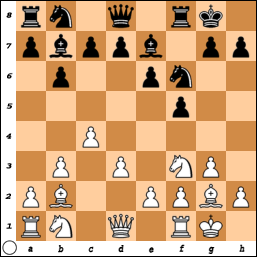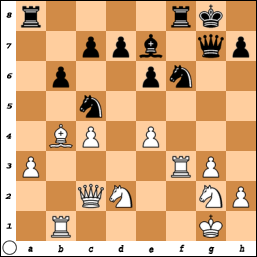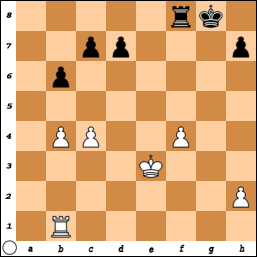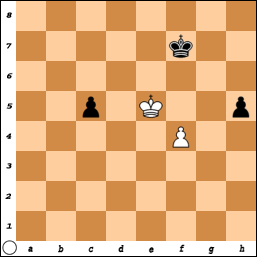Round One: English Opening, Dutch Defense
John Moldovan (USCF 1781) - Jim West (USCF 2247), Kenilworth NJ 11/5/1991
1.Nf3 f5
1...c5 2.c4 Nc6 3.Nc3 g6 4.e3 Bg7 5.d4 d6 6.Be2 Bg4 7.O-O Nf6 8.d5 Bxf3 9.Bxf3 Ne5 10.Be2 O-O 11.f4 Ned7 12.Bd2 Ne8, Moldovan-West, Kenilworth NJ 11/10/1990; 13.Bd3+/- (Fritz8).
2.g3 b6 3.Bg2 Bb7 4.O-O Nf6 5.c4
5.d4 e6 6.c4 Be7 7.b3 O-O 8.Nc3 Ne4 9.Qc2 d6 10.Ne1 Nc6!? (10...d5=)
a) 11.Bxe4 fxe4 (11...Nb4?! 12.Bxb7! Nxc2 13.Nxc2 Rb8 14.Bc6+/-) 12.Qxe4+/=;
b) 11,e3?! Nb4 12.Qb2 c5 13.a3 Na6 14.Nd3 Qd7, Moldovan-West, Kenilworth NJ 4/13/1991; 15.f3= (Fritz8);
5.d3 e6 6.e4 fxe4 7.Ng5 Be7 8.Nc3 O-O 9.Ngxe4 Nxe4 10.Nxe4 Nc6=, Euwe-Tartakower, Bad Kissingen 1928.
5...e6 6.b3 Be7 7.Bb2 O-O 8.d3
8.Nc3 Qe8 9.e3 a6 10.Ne2 c5 11.d3, Pontius Courtney-Moldovan, Springfield NJ 8/28/2005; 11...Nc6=.
8...a5 9.Nbd2 Na6 10.a3 Qe8 11.Qc2 Nc5 12.Rab1
A bit slow. An immediate 12.b4 is better, e.g. 12...axb4 13.axb4 Na6 14.b5 Nc5 15.Rxa8 Qxa8 16.Ra1+/=.
12...Qh5 13.Bc3 g5 14.b4 axb4 15.Bxb4?
15.axb4=.
15...g4 16.Ne1 Bxg2 17.Nxg2 Qf7 18.f3 Qg7 19.e4??
Correct is 19.d4 Nb7 20.fxg4 Bxb4 21.axb4 Nxg4 22.e3 Nd6+/=. Now Black gets a clear advantage.
19...gxf3 20.Rxf3 fxe4 21.dxe4
At this point, with my opponent in a lengthy think that must have lasted twenty minutes, it became obvious he was onto something. I was able to foresee his reply and prepare the entire sequence of moves through my 30.gxf4, a total of 18 plies.
21...Nfxe4?
Played because White would otherwise have "the better middlegame" (West). But 21...Ng4-+ is winning.
22.Rxf8+ Rxf8 23.Nxe4 Qd4+ 24.Nf2 Ne4 25.Nf4
25.Qb2! Qxf2+ (25...Bc5? 26.Bxc5 Qxc5 27.Rf1+/-) 26.Qxf2 Nxf2 27.Bxe7 Nh3+ 28.Kh1 Nf2+ 29.Kg1 Nh3+ is =.
25...Nxf2 26.Qxf2
Fearing discovered check, I overlooked 26.Bxe7 Ng4+ 27.Kh1 Ne3 28.Qb2 Qe4+ 29.Kg1 Nxc4 30.Qa1 Qe3+ 31.Kg2 Qe4+ 32.Kg1 Qe3+ 33.Kg2=.
26...Qxf2+ 27.Kxf2 Bxb4 28.axb4 e5 29.Ke3 exf4+ 30.gxf4
30...Ra8 31.Ke4
White has only a slight edge here because Black's rook is too active. Unfortunately, I was in "major upset" fantasy land, believing that my passed f-pawn gave me winning chances.
31...Ra2 32.Rd1 d6 33.Rg1+
Beginning an unbelievably rapid decline. 33.h3 is still +/= (Fritz8), e.g. 33...Ra4 34.Rb1 c5 35.bxc5 Rxc4+ 36.Kd3 Rxc5 37.Rxb6 Rh5 38.Rxd6 Rxh3+ 39.Ke4 Rg3 40.Kf5.
33...Kf7 34.h4
One square too far. Now my rook can't protect the h-pawn.
34...Rh2 35.Rg5?
Better is 35.Ra1 with the idea of 35...Rxh4 36.Ra7 or 35...Ke7 36.Rg1 Kf6 37.Rg8 Rxh4 38.Rf8+ Kg6 39.Rf5.
35...Rxh4 36.c5?
36.Rf5+ Ke6 37.Rf8=/+.
36...dxc5 37.bxc5 Rh6 38.cxb6 cxb6 39.Rb5 Rc6 40.Kf5??
40.Rh5 h6 41.Rb5 Re6+ 42.Kd4 Kf6 43.f5 Rc6=/+ or 40.Kf3 Ke7 41.Kg4 Kd7 42.f5 h6 43.Rb3 Rf6 44.Kf4 Ke7 45.Kg4 Kd7=/+ (Fritz8).
40...Rc5+ 41.Rxc5 bxc5 42.Ke5 h5, White resigns.
The Kenilworth Chess Club held five 2nd Saturday Swisses in the fall of 1990 and spring of 1991. But, during the spring 1991 event, an onlooker leaned on a ping pong table, knocking it over. My opponent complained to the New Jersey State Chess Federation, and there were no more tournaments.











































